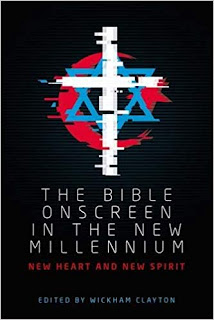
I have a great deal of sympathy for King Saul. I've experienced depression myself and have several close friends who have also struggled with it, so it, no doubt, makes me empathise with those whose minds trouble them.
It would be foolish, of course, to try and place a precise diagnosis on someone who is, essentially, just a character in a book. We only have a very small part of the picture and the writers hardly sympathise with whatever the mental troubles are that so afflicted Israel's first king, nor do they have any sort of expertise in mental health. Indeed they, like most people of their time linked mental health problems to demon possession. Yet whilst scholars are becoming more comfortable aligning, say, some of the 'demoniacs' that Jesus 'exorcised' with epilepsy, there seem precious few revisionist takes on Saul.
Saul, was a young and tall man when he was, rather surprisingly, anointed king of Israel. He was not at all prepared for the role - his family amongst the lowest in Israel - but found himself thrust into the limelight with only the resentful Samuel as his mentor. Yet despite the odds against him, he unites Israel and wins a string of key victories over the enemies that had been afflicted him. The result? The kingship is torn away from him on a couple of technicalities and he never sees his guide and mentor again. He slides into an affliction so deep that the court worries about how to help him. Fearing he is cursed, he dithers when faced with Goliath (who according to some manuscripts may only have been a little taller than Saul) and sees another young man from a humble background to fight in his place. David's victory is decisive, but propels him to greater popularity than even his king.
We don't really know why Saul threw the spear at David. It's unlikely to be justified, but the sources all seem to favour David, despite his desertion to the Philistines, and so it's possible that the accounts of subsequent events are less than fair to Saul, but his reaction to David sparing his life is both an interesting contrast to the madman who we so often see depicted and a sign that sadness and humanity remained in his heart. His last acts smack of despair. Faced with a revived Philistine army, in desperation he consults a medium in the hope of reaching Samuel. Saul's worst fears and realised. The battle is lost. His sons are killed. He takes his own life.
The above is not meant as a serious historical account, nor as a neatly comprehensive Bible study. It's simply offered as a more sympathetic take on Saul - a man whose great potential was destroyed by his troubled mind.
I've been mulling this piece for a long time, perhaps almost a year since I first saw
The Bible's fourth part. Various films treat Saul more or less badly. In some such as
Rei Davi he is clearly stark, raving mad. In others, such as
The Story of David he is played more sympathetically.
The Bible's account is interesting because on the one hand it wants to stick closely to the text. It doesn't really want to appear historically inaccurate by allowing Saul to foam at the mouth. Yet on the other hand it goes to considerable length to cast Saul in a very poor light. In addition to the inclusion of all the major low points in Saul's life, the are three overarching ways in which his failings are highlighted / exaggerated: dialogue, storytelling licence and visual representation.
Dialogue
As a series
The Bible often uses paraphrased / invented dialogue but uses archaic sounding language to give it an air of authenticity. This is particularly true of the narrator whose authoritative voice lend the production the additional impression of credibility, particularly as the series first broadcast on the History Channel.
In the fourth part of this series the narrator adds various bits of dialogue that emphasise and exaggerate Saul's failings. When Saul is condemned for not destroying Agag and the Amalekite animals the narrator concludes that "in trying to please his men Saul has displeased God". Later on he tells us that Saul is now "obsessed with destroying David".
When
The Bible's characters speak it is a mix of the semi-archaic and modernised dialogue, but it too is used to paint Saul in a poor light, emphasising his paranoia ("he'll want my crown next". "He wants our crown, can't you see?") as well as the extent of his problems ("Father! What demons posses you?"). There is also a good deal of mad/paranoid shouting at various points in the episode.
Storytelling Licence
All visual interpretations of the Bible involve a degree of artistic licence, but the ways in which the narrative varies from that in 1 Samuel is fairly telling, frequently painting Saul in a worse light that the biblical text. An early example is the first time Saul attacks David. In the Bible Saul throws his spear at David, just before he goes on to allow him to marry his daughter. It's a moment of insanity, but in the Bible it occurs when David returns from de-foreskinning 200 Philistines and Saul still appears to be brooding about the failure of his plan to endanger his future son-in-law. Later when Michal protects David by claiming he is ill, it's Saul himself who barges into Michal's room, rather than sending one of his men. It implies a kind of driven madness that is simply not their in the biblical account.
Another occasion when the programme pushes a little beyond the biblical account is when David "spares" Saul's life. In both accounts of this in 1 Samuel Saul repents and calls David his son. In the first account (ch.24) he even weeps. In this film however Saul remains annoyed and angry about the incident and shows no remorse. Finally, Saul's suicide in 1 Samuel happens as Saul is fleeing and pressed hard by the battle. He seems to kill himself to avoid the punishment that the Philistines mete out to his corpse instead. Here however when Saul takes is own life he is under no particular pressure certainly not in the heat of battle.
Visual Representation
A few of the techniques used here also make Saul seem less sympathetic. The first is that the actor chosen to play Saul is far less attractive that the actor who plays David. There is only 4 years between the two men but whereas Langley Kirwood who plays David seems hunky and youthful, Francis Magee, who plays Saul, seems old an haggard. Magee's demeanour doesn't really help matters, he sneers and hardly ever smiles.
The camera-work also adds an extra dimension here. Saul is often shot using a hand-held camera, for example in one scene when he is tossing and turning on the bed. Later on he prays and this time not only is a hand-held camera used it is held at a low angle and extremely close up, giving a real air of madness to Saul's attempts to reconnect with God.
I'm not sure why this episode stuck in my mind as it did. Perhaps it is just the way that for all the things that are going on around him Magee manages to find some humanity in Saul and help us find some pity for him. But perhaps it's just the way in which a number of small changes all pointing in a certain direction seem to go above and beyond what seems, to me at least, an already harsh assessment in the pages of 1 Samuel.
=======
Whilst I'm here I noticed a few other things in this issue not relating to the main issue discussed above. The first is when David enters Jerusalem a hero and petals rain down on him from the buildings above. It's noticeable for two reasons, firstly I'm not sure we know about the kind of buildings the Israelites were living in at this point - they had yet to conquer Jebus - but this kind of multi-storey courtyard seems a little far-fetched. It's also noteworthy because this shot is repeated (I believe) in a later scene where one of David's descendants (Jesus) also parades into a city and is greeted by a shower of petals. Later Jesus enters the same courtyard on the way to Golgotha, but this time is only treated with derision. Again, if memory serves the raining petals motif is something borrowed from
Last Temptation of Christ.
Speaking of visual nods to Bible films gone by, there is an awful lot of similarity between the wooden screens Bathsheba gets changed behind in this film and in 1951's
David and Bathsheba. Interestingly Bathsheba is also involved in the scene where the ark is brought into Jerusalem. It takes a bit of re-arrangement to make this happen (in 2 Samuel David's affair with Bathsheba is five chapters
after the ark has been brought into the city), but it does throw fresh light onto why David's dancing was undignified and why his first wife, Michal, was not best pleased.
Labels: Bible Miniseries (History Channel), David

















